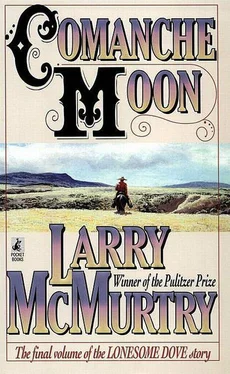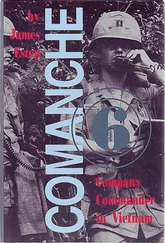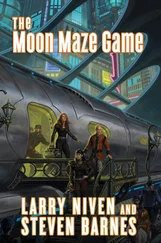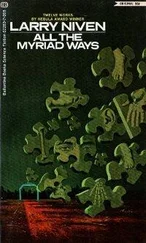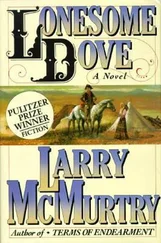"There's a fine spring about three hundred miles due north of here, Major," he said.
"I expect you could reach it in a week if you don't lose your compass again." "Sir, three hundred miles?" Major Featherstonhaugh asked, aghast.
"That is, if you can get through the Comanches," Goodnight added.
"How many Comanches, and how far ahead?" Augustus asked.
The soldiers, some of whom had been grimly amused by Goodnight's brusque treatment of Major Featherstonhaugh--he was not a popular leader--ceased to be amused; mention of Comanches was enough to quell all merriment in the troop and replace it with dread. The thought of Comanches called into their minds scenes of torture and dismemberment. They had all heard too many stories.
"Charlie, have you run into our red foes?" Augustus inquired again.
"Crossed their trail," Goodnight said.
"It's a hunting party. They're about thirty miles ahead of us, but they're lazing along. I think we can overtake them if we hurry.
They've got nearly fifty stolen horses and I expect a captive or two." "Then let's go," Augustus said. Before putting spurs in his horse and following Goodnight, who had already left--he had reached down and accepted a tin cup full of coffee from Deets and drained it in three swallows-- Augustus looked back at the few dirty, discouraged, ignorant, and ill-paid men that constituted the troop, all of whom, including Major Featherstonhaugh, looked as if they wished they could be somewhere else in the world.
"We're going after the Comanches--don't lame your horses," Gus said. "It's lucky you dropped your compass, Major. The horses got a night's rest and that might make the difference." Then he turned and rode. It was cruel to press men as hard as it would be necessary to press them now, but the alternative was to lead a futile expedition that would accomplish nothing. With war raging among the whites, the Comanches had grown bold again--in some places the line of white settlement had been driven back almost one hundred miles. Only those settlers brave enough to live in homemade forts and risk death every day as they worked in their fields farmed the western country now. He and Call had had to abandon the border to banditry; answering raids on the northwestern frontier took all their time and resources.
Lately they had scarcely been in town long enough to launder their clothes.
The rangers were too few in number to overwhelm the war parties, but their guns had improved and their marksmanship as well. They would sometimes demoralize their attackers by killing a few prominent warriors--z fighting men they had become a match for the Comanches, but their horses, for the most part heavy and slow, were rarely capable of keeping up with the leaner, faster Comanche ponies.
Goodnight, in his brief time in the soldiers' camp, had quickly sized up the state of the horses. When Augustus caught up with him he did not hold back his assessment.
"Those horses are just glue buckets with legs," he told Augustus. "I doubt they've got fifty miles in them." "I doubt they've got forty," Gus agreed.
Goodnight, of course, was well mounted, on a gelding with sure feet and abundant wind; Augustus, likewise, had taken care to provide himself with a resilient mount. But most of the troopers were not so fortunate.
"We're fighting horse Indians, not walking Indians," he himself had pointed out, to more than one governor and many legislators, but the rangers were still mounted on the cheapest horseflesh the horse traders could provide, an economy that cost several rangers their lives.
"Who are we chasing? Do we know?" he asked Goodnight--he had come to know the fighting styles of several Comanche chiefs rather well.
"Peta Nocona and some of his hunters," Goodnight said. "That's what I think, and Famous Shoes agrees." "I wonder if Buffalo Hump is still alive," Augustus said. "You'll still hear of Kicking Wolf taking horses now and then, but we ain't had to engage Buffalo Hump since the war started." "He's alive," Goodnight said.
"How do you know?" Gus asked.
"Because I'd hear of it if he died," Goodnight said. "So would you. He led two raids all the way to the ocean. No other Comanche has done that. They'll be singing about him, when he dies." Goodnight had a disgusted look on his face.
"I guess you're mad at me, Charlie, for not keeping up," Augustus ventured.
"No, but I won't come back for that major again," Goodnight said. "If he can't keep hold of his compass then I'd rather he went home."
Buffalo Hump was slow to recover from the shitting sickness--the cholera; for the first time in his life he was forced to live with weakness in his limbs and body. For two months he could not mount a horse or even draw a bow. His wives fed him and tended to him. A few of the warriors still came to confer with him for a while, but then they began to avoid him, as the strong always avoid the weak. Kicking Wolf was stealing many horses from the Texans, but he did not ask Buffalo Hump to raid with him, anymore.
No one asked Buffalo Hump to raid with them now, although warriors from many bands raided frequently. Many whites had gone to fight other whites, in the East; there were few blue coated soldiers left, and few rangers to defend the little farms and settlements. The young warriors killed, tortured, raped, and stole, but they did not take Buffalo Hump with them, nor did they come to him to brag of their courage and their exploits when they returned from the raids with horses or captives.
They did not ask Buffalo Hump, or brag to him, because he was not young anymore. He had lost his strength, and, with his strength, lost his power.
Buffalo Hump was resentful--it was not pleasant to be ignored or even scorned by the very warriors he had trained, the very people he had led--but he was not surprised. Many times he had seen great warriors weaken, sicken, grow old, lose their power; the young men who would have once been eager to ride with them quickly came to scorn them. The young warriors were cruel: they whispered and snickered if one of the older men failed to make a kill, or let a captive escape. They respected only the strong men who could not be insulted without a price being paid in blood.
When Buffalo Hump saw that the time had passed when he could be a powerful chief, he had his wives move his lodge into a cleft in the canyon some distance from camp. He wanted to be where he would not have to listen to the young men brag after each raid--even the screams of tortured captives had begun to irritate him. Buffalo Hump would not be scorned, not in his own camp; if he heard some young warrior whispering about him he would fight, even if it meant his death. But he thought it was only a foolish man who put himself deliberately in the way of such challenges. He took himself away, too far from the main camp for the shouting and dancing to disturb him.
Then he instructed his wives, Lark and Heavy Leg, how to make good snares--it was a craft he expected them to learn. There was little large game in the canyon now, but plenty of small game: rabbits, skunks, ground squirrels, prairie dogs, quail and dove, possums, and fat prairie hens. He wanted his wives to work their snares and catch what food they needed. When his strength returned, so that he could draw his bow and throw his lance, he meant to journey alone with his wives north to the cold rivers where the buffalo still lived. He would take two pack horses and kill enough meat to last all winter.
The shitting sickness had not affected his eyes, though, or his ears. He saw the young men riding south, murder in their hearts, singing their war songs; and he could count, as well. He saw how many young men rode out and he saw how many came back. In his days of raiding he rarely lost more than one or two warriors to the guns of the Texans. If he lost more than three men he did not claim victory; and, always, he recovered and brought back the bodies of the fallen warriors, so they could have a proper burial. Now, though, when the young men came back, claiming victory, they had sometimes lost five or six men; once they even lost eight, and, another time, ten. Seldom, in those battles, did they recover more than one or two bodies to bring home. Many warriors were left unburied, a thing that in his time would have shamed any chief or warrior who led a raid.
Читать дальше
